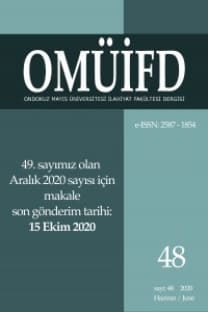İMAM‐HATİP LİSELERİNDE ÇALIŞAN ÖĞRETMEN VE YÖNETİCİLERİN OKUL İKLİM ALGISI VE BU ALGIYA ETKİ EDEN FAKTÖRLER (İSTANBUL ÖRNEĞİ)
Bu çalışmanın amacı, İstanbul’daki imam hatip liselerindeki öğretmen veyöneticilerinin okul iklimi algılarını belirlemek ve elde edilen verilere göreçözüm önerileri geliştirmektir. Araştırmada veri toplama aracı olarak 64maddeden ve 8 boyuttan oluşan ”Okul İklimi Ölçeği” kullanılmıştır.Araştırmaya imam hatip liselerinde öğretmen ya da yönetici olarak çalışan %55’i erkek, % 45’i kadın, 21‐62 yaş (M=38) arasında değişen 271 kişikatılmıştır. Cinsiyet, yaş, medeni durum, eğitim durumu, mesleki kıdem,okulda bulunulan görev gibi değişkenlerin okul çalışanlarının okul iklimialgısını etkileyip etkilemediği incelenmiş ve cinsiyetin, medeni durumun veyaşın okul iklimi algısında farklılık oluşturduğu görülmektedir. “AnlayışGösterme”, “Yakından Kontrol”, “İşe dönüklük”, “Moral” ve “Samimiyet”boyutlarının sırasıyla imam hatip okullarındaki okul iklimi üzerinde en etkilifaktörler olduğu tespit edilmiştir
Anahtar Kelimeler:
Örgütsel İklim, Okul İklimi, İmam Hatip Liseleri, İmam Hatip
Perception of School Climate in Their Institution by School Principals and Teachers working in Imam Hatip Schools
The goal of this study is to determine school climate perceptions of ImamHatip School principals and teachers in Istanbul and to develop solutionsuggestion according to the data obtained. The data collection tool that wasused in the research OCDQ consisted of 64 items and 8 dimensions. Thesample of the study covers 271 school principals and teachers; sample of %45 females and % 55 males. The age range of the sample was between 21 and62. The mean age was 38 years old. In analyses, the relations between schoolclimate perception and independent variables like sex, age, marital status,educational status and the current task in the school were examined.Accordingly it is seen that sex, marital status, and age affect perception of school climate. Generally in imam hatip schools, factors of school climate like"indulgence, closer control, work extraversion, moral and sincerity" are moreeffective on the school climate.
Keywords:
-,
- Yayın Aralığı: Yılda 2 Sayı
- Başlangıç: 1986
- Yayıncı: ONDOKUZ MAYIS ÜNİVERSİTESİ
Sayıdaki Diğer Makaleler
KUR’AN’IN SUNDUĞU ZİHNİYET DEĞİŞİMİNE KARŞI BİR DİRENİŞ ÖRNEĞİ OLARAK KALIP YARGI VE ÖN YARGILAR
XVI. YÜZYIL OSMANLI FETVALARINDA AHİLİK
In the wake of a symposium in Hakkari, symposium on women and family issues
Classical Theological Issues in Al-Juvaini - The Case of Al-Aqida Al- Nizamiyya
CULTURAL IDENTITY AND YOUTH (THE CASE OF MUSLIM SOCIETY)
ARAPÇA ALINTI KELİMELERİN LEZGİ DİLİNDEKİ SES KARŞILIKLARI ÜZERİNE BİR DEĞERLENDİRME
HZ. OSMAN DÖNEMİNDE İSTİNSAH EDİLEN MUSHAFLARIN AKİBETİ
To Go Through From The West Side To The East: JANE DAMMEN MCAULIFFE and Qur'anic Christians
